Donald Robertson • • 10 min read
Best Books on Stoicism: 3 Essential “Must-Read” Classics
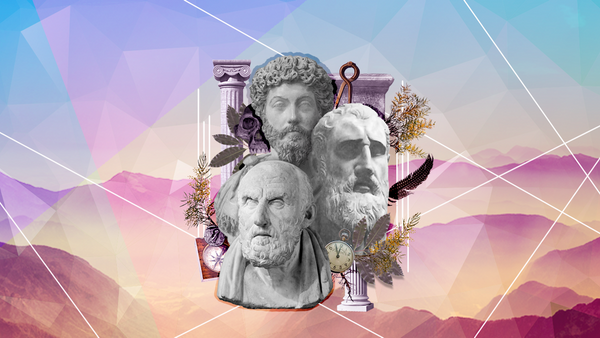
Let these doctrines, if that is what they are, be enough for you. As for your thirst for books, be done with it, so that you may not die with complaints on your lips, but with a truly cheerful mind and grateful to the gods with all your heart. (Meditations, 2.3)
The Roman Emperor Marcus Aurelius, like other Stoics, believed that it was more important to apply philosophy in practice, throughout our daily lives, than simply to read about it in books. However, he also owned a copy of the Discourses of Epictetus, gifted to him by his Stoic mentor Junius Rusticus, which he quotes repeatedly and had clearly studied very closely indeed.
The philosopher Seneca explains the Stoic attitude toward reading as being more about quality than quantity:
Be careful, however, lest this reading of many authors and books of every sort may tend to make you discursive and unsteady. You must linger among a limited number of master thinkers, and digest their works, if you would derive ideas which shall win firm hold in your mind. Everywhere means nowhere. When a person spends all his time in foreign travel, he ends by having many acquaintances, but no friends. And the same thing must hold true of men who seek intimate acquaintance with no single author, but visit them all in a hasty and hurried manner. (Letters to Lucilius, 2)
When Jeff Beck sang “You’re everywhere and nowhere, baby”, in Hi Ho Silver Lining, he could have been quoting Seneca. The Stoic also advises his friend Lucilius that people who constantly change the medicine they’re taking get little benefit. We should identify the most valuable and best books on Stoicism and study them very closely, reading them repeatedly, rather than behaving like a dilettante and dipping first into one book and then another without allowing ourselves the time to properly digest any of the ideas they contain, let alone put them into practice.
Below I’ve listed the best books on Stoicism, at least as far as I’m concerned. (I’ve grouped them under three main headings, by author, although you’ll notice that I’ve sneakily mentioned more than one text in some cases.) If you’re interested in Stoicism you should probably read these over and over again until you know many of the passages by heart. Some of you will already have read these books so I wanted to add some anecdotes about the historical context in which they were written. That’s the approach I adopted when writing my latest book How to Think Like a Roman Emperor: The Stoic Philosophy of Marcus Aurelius. I repeatedly found over the years, running courses and workshops on Stoicism, that people tended to get roughly twice as much out of these books if they read them closely and understand more about the author and their times.
Three Best Books on Stoicism
The Meditations of Marcus Aurelius
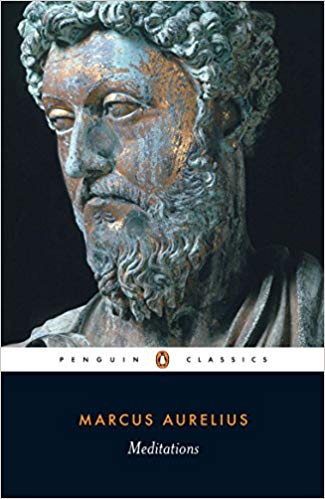
After the untimely death of his brother and co-emperor, Lucius Verus, Marcus, with no military experience whatsoever, donned the military cape and boots and rode out to take sole command of the largest army ever massed on a Roman frontier – numbering some 140,000 men in total. Following the Parthian War a devastating disease, known as the Antonine Plague, swept through the empire, particularly the legionary camps, leaving Rome highly vulnerable. Ballomar, the young king of the Marcomanni, seized his opportunity to spring a surprise attack and, in breach of existing peace treaties, led a huge coalition of hostile barbarian tribes across the River Danube, overrunning the northern provinces of the empire. The Marcomanni and their allies proceeded to loot and pillage their way across the Alps and finally laid siege to the prosperous Italian city of Aquileia, bringing war to the very doorstep of Rome herself, and throwing the city into panic.
After driving the enemy out of Italy and liberating the northern provinces, for much of the ensuing war, Marcus stationed himself at the front line, in the Roman legionary fortress of Carnuntum, beside the Danube. It was in the crucible of this gruelling war that The Meditations took shape. My belief is that Marcus may have been inspired to begin writing down his personal reflections on applying philosophy in daily life following the death of his beloved Stoic tutor, Junius Rusticus, possibly another victim of the plague. Deprived of his closest friend and mentor, Marcus became his own Stoic therapist, as it were, and worked through his emotions by writing short reflections, some of which were probably fragments of remembered conversations with his Stoic teachers.
In one of the most famous passages of The Meditations, which opens the main part of the book, Marcus reminds himself to prepare each morning to face dishonesty and treachery. The manuscript of The Meditations originally bore the title To Himself and this, the main part of the text, opens with the words “Say to yourself…”
Say to yourself at the start of the day, I shall meet with meddling, ungrateful, violent, treacherous, envious, and unsociable people. They are subject to all these defects because they have no knowledge of good and bad. But I, who have observed the nature of the good, and seen that it is the right; and of the bad, and seen that it is the wrong; and of the wrongdoer himself, and seen that his nature is akin to my own—not because he is of the same blood and seed, but because he shares as I do in mind and thus in a portion of the divine—I, then, can neither be harmed by these people, nor become angry with one who is akin to me, nor can I hate him, for we have come into being to work together, like feet, hands, eyelids, or the two rows of teeth in our upper and lower jaws. To work against one another is therefore contrary to nature; and to be angry with another person and turn away from him is surely to work against him. (Meditations, 2.1)
Most people assume he’s talking about petty matters but Marcus also faced some massive, historic, acts of betrayal, such as the conspiracy leading to the Marcomanni invasion described above. This passage seems all the more remarkable, doesn’t it, if we stop to consider whether this was how Marcus looked upon the enemy tribes he was waging war against?

The Meditations is a very easy book to read but in my experience people do obtain much more from it when they study the text more closely, and learn a little more about the historical and philosophical context in which it was written. That’s why I wanted to write a book about Marcus Aurelius that linked the inner story of his life, as a philosopher, as found in The Meditations, with the stories of his outer life, as Roman emperor, as told in several Roman histories of his reign, and a few other ancient sources that we still have today.
The Handbook and Discourses of Epictetus
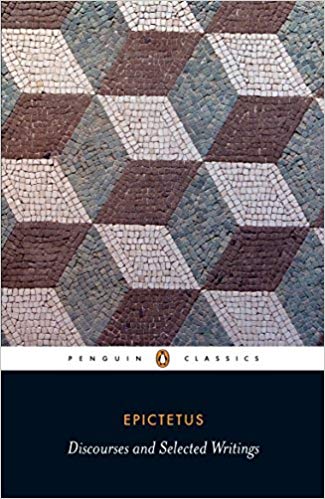
The Handbook or Enchiridion of Epictetus, which is actually a series of fifty three sayings and short passages based on The Discourses, compiled and edited by his student Arrian. It’s an obvious choice because it’s short and easy to read. It was specifically designed by Arrian to provide a simple, practical introduction to Stoicism, almost like a bullet-point summary of the much longer Discourses. Marcus Aurelius also quotes repeatedly from The Discourses and he seems to be mainly following Epictetus’ brand of Stoicism. So if you like The Meditations, you’ll almost certainly like The Handbook as well. And if you like The Handbook, you’ll probably like the longer and more discursive version of the same ideas found in The Discourses.
According to some ancient sources there were originally eight volumes of The Discourse of Epictetus. Unfortunately, only four actually survive today. Intriguingly, though, Marcus Aurelius says that he was given a copy of notes from the lectures of Epictetus by his tutor Junius Rusticus. (Marcus was a young boy when Epictetus died and they’d almost certainly never met in person.) As Marcus later quotes from the surviving Discourses we can be fairly certain those are the notes to which he’s referring. However, he also quotes otherwise unknown sayings of Epictetus, which suggests he’d perhaps also read the four lost volumes of The Discourses. In fact, for all we know some of the other passages scattered throughout The Meditations could be quotes or paraphrases from these missing books of Epictetus.
The most famous passage in The Handbook says that it’s not things that upset us but our judgements or opinions about them. Although this became to be seen as a typically Stoic idea, it can actually be traced back to Socrates, the philosopher whom the Stoics most admired and sought to emulate. Indeed, Epictetus hints at this by immediately bringing in Socrates as an example:
Men are disturbed not by the things which happen, but by the opinions about the things: for example, death is nothing terrible, for if it were, it would have seemed so to Socrates; for the opinion about death, that it is terrible, is the terrible thing. (Handbook, 5)
The first part of that quote encapsulates what psychologists now call the “cognitive theory of emotion”. (It’s our thoughts and beliefs, aka “cognitions”, that largely determine our emotions.) It was adopted by Albert Ellis, one of the pioneers of cognitive therapy, in the 1950s, who taught it to most of his clients in their initial session. Hence, it became well-known, almost a cliche, to subsequent generations of cognitive-behavioural therapists.
The second most famous passage from The Handbook is its very first sentence: “Some things are up to us whereas other things are not” (Handbook, 1). There’s clearly a good reason why Arrian chose that as the opening sentence: it’s the foundation of everything that follows. The Stoics believed that we need to train ourselves throughout life to carefully distinguish between things that are directly under our control and everything else.
This concept also became famous through the Serenity Prayer, popularized by Alcoholics Anonymous: “God grant me the serenity to accept the things I cannot change; courage to change the things I can; and wisdom to know the difference.” Today Stoics tend to call this idea the “Dichotomy of Control”, and I also tend to describe it as the “Stoic Fork” because it involves making a sharp distinction between two domains in life: what we do and what merely happens to us.
Seneca’s Letters to Lucilius
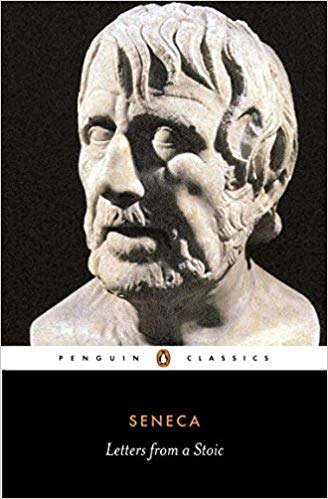
I said that Marcus doesn’t mention Seneca in Greek but we also have a surviving cache of letters between Marcus and his Latin rhetoric tutor, Fronto. In these, Fronto several times mentions Seneca, in a manner that seems rather derisive. At one point he even goes so far as to warn Marcus that looking for pearls of philosophical wisdom in the writings of Seneca is like grubbing around in the bottom of a sewer just to retrieve a few silver coins. We don’t really see much of Marcus’ response to this. My guess is that they may have been talking about political speeches by Seneca rather than the philosophical letters he’s best known for today. We get a glimpse of what these may have been like in texts such as On Clemency, where Seneca awkwardly defends Nero, portraying him as a virtual philosopher-king without a drop of blood on his hands, etc. – a claim that would have been laughable to the Senate. By contrast, Epictetus warns his students against flattering tyrants. He had originally been a slave owned by one of Nero’s secretaries and probably witnessed first-hand some of the intrigue and chaos surrounding the imperial court at this time.
During Nero’s reign a group of politicians known as the “Stoic Opposition” adopted a principled stance against him, led by Thrasea, a close friend of the famous Stoic teacher Musonius Rufus, whose student Epictetus would later become. These men criticized Nero more openly than Seneca dared. When Nero sent the Senate a letter trying to excuse the murder of his own mother by claiming that she had been discovered plotting against him and had committed suicide Thrasea silently walked out of the meeting. These acts of peaceful protest undoubtedly provoked Nero’s wrath.
And indeed this was always his way of acting on other occasions. He used to say, for example: “If I were the only one that Nero was going to put to death, I could easily pardon the rest who load him with flatteries. But since even among those who praise him to excess there are many whom he has either already disposed of or will yet destroy, why should one degrade oneself to no purpose and then perish like a slave, when one may pay the debt to nature like a freeman? As for me, men will talk of me hereafter, but of them never, except only to record the fact that they were put to death.” (Cassius Dio)
I think Thrasea was talking about Seneca here, among others, and that may explain why later generations of Stoics don’t mention his name. Epictetus and Marcus, on the other hand, both heap praise on members of the Stoic Opposition. Indeed, the Handbook concludes with a quote attributed to Socrates which says “Anytus and Meletus can kill me but they cannot harm me”, referring to the two key individuals who brought the charges leading to his execution. (It’s perhaps a paraphrase from Plato’s Apology.) However, Epictetus’ students must have recognized that as a tribute to Thrasea because Cassius Dio tells us that he was famous for applying the same saying to Nero: “Such was the man that Thrasea showed himself to be; and he was always saying to himself: ‘Nero can kill me, but he cannot harm me.’”
Despite his murky political leanings, though, and pace Fronto, Seneca’s philosophical writings do contain a great deal of valuable Stoic wisdom. The Letters to Lucilius, of which there are 124, are the most common place for people to start. If you like those, you should read Seneca’s other letters and essays, perhaps starting with the consolation letters to Marcia, Helvia, and Polybius. These are important examples of the consolatio genre in philosophical literature, in which philosophical advice is given to a friend in order to help them assuage emotional suffering. They illustrate, in other words, a form of Stoic psychotherapy or counselling. Epictetus mentions that one of his heroes, a member of the Stoic Opposition called Paconius Agrippinus, used to write letters of this kind addressed to himself when faced with some personal catastrophe. In some respects, we can also see The Meditations (“To Himself”) of Marcus Aurelius as resembling a consolation letter addressed to himself, although written in the form of fragmentary passages rather than continuous prose.
If you’re looking for more recent books on Stoicism, here are my 5 best books on Stoicism from the modern era.
How to Think Like a Roman Emperor by Donald Robertson
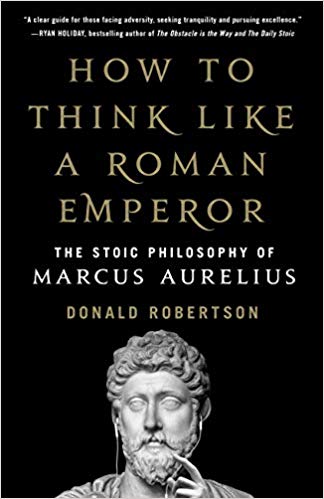
If you want to do more than read about the Stoics, if you seek to apply these truths to your life, to develop the virtue of the great Roman Emperor himself, take a look at the upcoming book by Donald Robertson.


![Seneca’s Groundless Fears: 11 Stoic Principles for Overcoming Panic [Video]](/content/images/size/w600/wp-content/uploads/2020/04/seneca.png)







